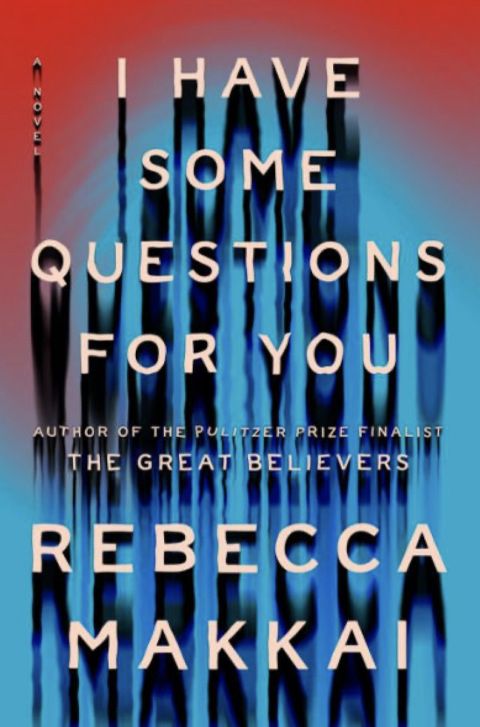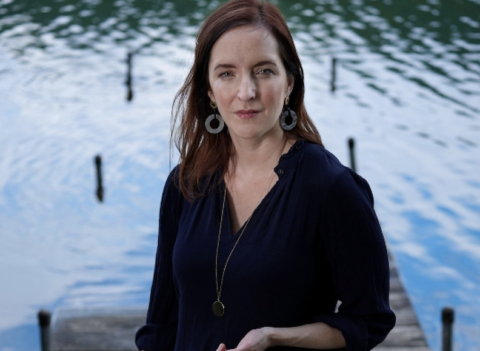Our relationship to true-crime stories has always been unserious. In the 70s and 80s, it was the stuff of lurid spinner-rack bestsellers like Helter Skelter about the Manson killings, or Fatal Vision about a Green Beret accused of murdering his family. In the 90s, kitschy TV shows like Unsolved Mysteries and Dateline used formulaic tropes to scrutinize an apparently bottomless supply of drowned, stabbed, and otherwise doomed (mostly) women. Today, the Netflix and podcast era has offered only more ways to consume actual death comfortably, and satires have exploded as well. The Saturday Night Live skit “Murder Show” describes watching Making a Murderer and its brethren, only half-jokingly, as “self-care.” The TV comedy Only Murders in the Building emphasizes its bumbling podcast-host leads — and life in the tony Upper East Side pile they occupy — in such a zany manner that the corpse is pretty much beside the point.
 Rebecca Makkai’s fifth novel, I Have Some Questions for You, strives to have it both ways: It levels a sober critique of a culture that treats women’s murders as spectacle, even while targeting the same pleasure centers that murder shows appeal to. It’s serious business and spinner-rack fun.
Rebecca Makkai’s fifth novel, I Have Some Questions for You, strives to have it both ways: It levels a sober critique of a culture that treats women’s murders as spectacle, even while targeting the same pleasure centers that murder shows appeal to. It’s serious business and spinner-rack fun.
Its narrator, Bodie, has returned to her New Hampshire prep school, Granby, to teach film history and podcasting for a few weeks in 2018. Her show, Starlet Fever, covers the lives of Hollywood women like Rita Hayworth and Judy Garland, “the ways the industry chewed them up and spat them out.” Bodie makes the appropriate gestures of ambivalence about the lurid nature of her obsession, and how she’s made a career of it: “I’m queasy about the fact that the women whose deaths I dwell on are mostly beautiful and well-off. That most were young, as we prefer our sacrificial lambs.”
Queasy is a good weasel-word — it’s how you feel when you’re uncomfortable but not actively disgusted. It’s sickness without actual illness. There’s a lot of wiggle room in queasy, and much of Questions is about how Bodie navigates within it. Is it appropriate for her to allow a student to pursue a true-crime podcast? Moreover, that the crime being investigated is the murder of Thalia, a classmate of Bodie’s at Granby back in 1995? (Dateline did an episode about it.) Is her refusal to explicitly stand in the way of these things a moral failing or a virtue? A new investigation may help reopen the case of a man perhaps wrongly imprisoned for the crime. Or it can just reopen his family’s wound and give the culture one more dead girl to gossip about.
Much of Questions focuses on how the media takes this messy ambivalence and then labors to oversimplify it. While visiting Granby, Bodie’s Twitter feed blows up with news that her husband, an artist from whom she’s kinda-sorta separated, stands accused of inappropriate behavior years earlier with a younger (but of-age) woman. The facts on the ground don’t seem to rise to the level of a MeToo-ing, but the internet’s hunger for victimhood, and victims, seems unstoppable. A tweet Bodie accidentally likes draws brickbats; her attempts to respond by applying some nuance to the situation naturally backfires.
Yet her mind goes to where every true-crime story tends to begin: “Just because you can’t picture someone doing something doesn’t mean they aren’t capable of it,” she thinks. As with her husband, so it is with Thalia’s cold case. Bodie’s mind cycles through possible murderers, from the gym teacher who was convicted on thin evidence, to Thalia’s hotheaded boyfriend, to a classmate, to — why not? — Bodie herself. (“What if my memories were as false as dreams? What if my dreams were really memories?”) Her preferred suspect is a teacher with whom he saw Thalia flirting way back when. She consistently refers to him as you, giving the book a dark, j’accuse-y vibe. But is this the deduction of a sober true-crime researcher or just the projection of a woman who has experienced one more story about an asymmetrical relationship gone badly? (“Things looked different in 2018. We were, all of us, casting a sharp eye back on the men who’d hired us, mentored us, pulled us into coat closets.”) It’s queasy-making stuff.
 The best parts of Questions apply some force and complexity to this crisis — it presents Bodie’s struggles not just as a plot complication but as an existential problem, an exploration of how we are going to treat death honorably, without shoving it into simplistic true-crime boxes. Talking through a former classmate, she dwells silently about the line between grooming and assault, considers speaking out about her accusation, but ultimately holds her tongue. She flirts to get information, nudges her student in certain directions, chooses what to say, and what not to. A lot hinges on what we choose to say, or don’t.
The best parts of Questions apply some force and complexity to this crisis — it presents Bodie’s struggles not just as a plot complication but as an existential problem, an exploration of how we are going to treat death honorably, without shoving it into simplistic true-crime boxes. Talking through a former classmate, she dwells silently about the line between grooming and assault, considers speaking out about her accusation, but ultimately holds her tongue. She flirts to get information, nudges her student in certain directions, chooses what to say, and what not to. A lot hinges on what we choose to say, or don’t.
The novel, Makkai knows, is a good place to get into this stuff — Unsolved Mysteries episodes have to fit into an hour, and podcasts have their own familiar arcs, but the novel can be a loose, baggy monster that thrives on ambiguity and misdirection. And you can feel Makkai — author of the excellent 2018 novel The Great Believers, a Pulitzer finalist — pushing against genre conventions. It is determined not to be a straightforward whodunit, nor a tale of MeToo-era trauma, or a dark-academia melodrama in the mode of Donna Tartt’s The Secret History. Bodie is a messy, at times amoral figure, but she doesn’t lapse into bwah-ha-ha unreliability. The novel’s chief virtue is that it has consumed the true-crime tropes — the way it exploits certain moments for comic relief or forced gravitas, and sidesteps them.
But, without giving too much away, all that sidestepping ultimately circles Makkai back into the familiar turf of the procedural and court-trial story. If the final third of the book is weaker, it’s largely because it’s dealing with well-worn material of scrutinizing evidence and legal parrying. Although in the context of this novel, it reads as a bitter irony: The consequence of all this serious moral handwringing is to watch the same old gears of the justice system imperfectly grind in the same old ways.
Toward the end, Bodie says this of a suspect: “I was mistaken, but I wasn’t incorrect.” The statement is illogical on its face: an error is an error is an error. But Bodie (and Makkai) isn’t just playing semantics. The line speaks to the problem that Bodie (and Makkai) is working through: That being absolved of legal crimes like assault and abuse doesn’t mean somebody isn’t exploiting a power imbalance, isn’t subtly being manipulative. “I think it’s become so trendy, don’t you? To accuse people of things,” a former teacher tells Bodie. True enough. But it’s worth the effort to work through what an accusation means, and where the law falls short of understanding it. To identify the harm, correctly. To, as good novels do, find the right words for it.